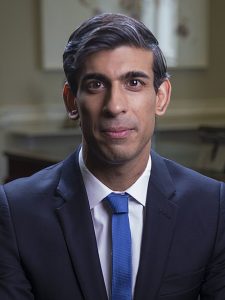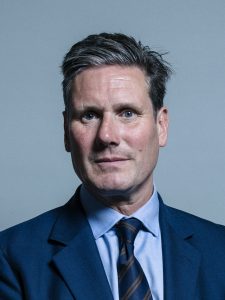The State of Sustainability in UK Politics
As a political nerd (and local politician*), I always try to watch as many of the leaders’ speeches during the UK party conference season as I can – and I always write them up here. My thesis is that the leaders’ speeches are a much better barometer of the state of Sustainability in each party than their Environment Spokesperson because they show the priority given to Sustainability relative to other issues. Normally I do this in chronological order, but due to some announcements being made pre-conference, I’ve rearranged them to present a logical narrative:
 The Prime Minister Rishi Sunak made several major announcements on Sustainability just before the Conservative Party Conference as they had been leaked to the press. Specifically he pushed back two key interim targets from 2030 to 2035: a ban on selling new internal combustion engine cars and installing gas boilers (he also announced the cancellation of several policies which had never been heard of before, most notoriously, a ‘meat tax’).
The Prime Minister Rishi Sunak made several major announcements on Sustainability just before the Conservative Party Conference as they had been leaked to the press. Specifically he pushed back two key interim targets from 2030 to 2035: a ban on selling new internal combustion engine cars and installing gas boilers (he also announced the cancellation of several policies which had never been heard of before, most notoriously, a ‘meat tax’).
In his conference speech Sunak presented this decision as “pragmatic, proportionate and realistic approach to reaching net zero.” He claimed the targets would’ve forced the poorest in society to pay thousands of pounds and were not necessary to meet the Net Zero by 2050 target. I had expected a new Net Zero policy to be announced here to sweeten this particular pill, but there was nothing.
The other major Sustainability-related element of Sunak’s speech was his announcement that HS2, the high speed rail project, would terminate in Birmingham and not be extended to Manchester as planned (the other Northern links having been cancelled earlier). The sweetener here was a pledge to invest the savings in a plethora local transport schemes, including road schemes, although some of these have since been described as “illustrative” and a big chunk of the money seemed to be earmarked for fixing potholes.
 Leader of the Opposition Keir Starmer is very conscious that the Tory election strategy is to present his Labour Party as ‘woke’ and elitist, and his speech seemed designed to avoid stepping in traps laid by the Net Zero announcement pre-conference season. While there were several nods to Sustainability throughout, the concrete policy section revolved around his proposed new publicly owned company, GB Energy:
Leader of the Opposition Keir Starmer is very conscious that the Tory election strategy is to present his Labour Party as ‘woke’ and elitist, and his speech seemed designed to avoid stepping in traps laid by the Net Zero announcement pre-conference season. While there were several nods to Sustainability throughout, the concrete policy section revolved around his proposed new publicly owned company, GB Energy:
Clean British energy is cheaper than foreign fossil fuels. That means cheaper bills for every family in the country. But also a chance to make us more competitive across the board. Countries like America are using this gift to create manufacturing jobs the like of which we haven’t seen for decades. And they’re not the only ones. So when Rishi Sunak says row back on our climate mission, I say speed ahead.
Speed ahead with investment. Speed ahead with half a million jobs. Speed ahead with Great British Energy. A new energy company that will harness clean British power for good British jobs. A company that will be publicly owned, conference, and that will be based in Scotland. Because though Great British energy will be a shared mission, Scotland has the skills. Scotland has the ingenuity. And Scotland is at the heart of a Britain built to last.
 Ed Davey, leader of the Liberal Democrats, spoke before Sunak or Starmer. Davey has served as Government Minister for Energy and Climate Change, and the climate element of his speech similarly made the case for a clean energy economy:
Ed Davey, leader of the Liberal Democrats, spoke before Sunak or Starmer. Davey has served as Government Minister for Energy and Climate Change, and the climate element of his speech similarly made the case for a clean energy economy:
In Government, we made Britain the world leader in offshore wind. We invested early. We had an industrial strategy. We showed we were serious. We attracted global firms to come to the UK, and spend tens of billions of pounds to build factories and windfarms and create thousands of clean, secure jobs. And thanks to Liberal Democrat policies, the price of wind energy has more than halved.
So now renewables are by far the cheapest form of electricity. And the most popular. We could be doing the same with so many other new technologies. Tidal power. Clean flight. High-speed rail. Creating jobs and cutting prices. But Rishi Sunak says no. We say: build Britain’s economic future here in the UK. Rishi Sunak says: outsource it to China.
 Finally Humza Yousaf, the new leader of the Scottish National Party following the sudden exit of Nicola Sturgeon under a cloud of allegations. I didn’t get to watch his speech but, from the transcript, Yousaf’s key message was a ‘Just Transition’ from the oil and gas industry to renewables, pledging to invest £500m over 5 years in the wind industry supply chain.
Finally Humza Yousaf, the new leader of the Scottish National Party following the sudden exit of Nicola Sturgeon under a cloud of allegations. I didn’t get to watch his speech but, from the transcript, Yousaf’s key message was a ‘Just Transition’ from the oil and gas industry to renewables, pledging to invest £500m over 5 years in the wind industry supply chain.
Cutting emissions, creating sustainable jobs and sending a clear message to global investors – Scotland means business.
OK, so where does this leave us? I think you have to see this through the lens of the impending General Election. This will be fought on three fronts: Scotland where the SNP have reigned supreme for the last eight years with the once dominant Labour Party was deduced to a single seat, the Red Wall in England where the Tories won a swathe of traditionally Labour-voting seats in 2019, and the Blue Wall where Davey’s Lib Dems hope to pick up a load of seats from the Conservatives by appealing to disillusioned liberal Tories and tactical voters.
Given Sunak’s clear intention to turn Sustainability into a culture war-style hot potato, it is no surprise to see Starmer, Davey and Yousaf present Sustainability as a massive economic opportunity (jobs! cheap energy!) rather than a moral crusade. It was notable that none pledged to reverse Sunak’s announcements on either of the 2030 targets or HS2, clearly smelling a trap. Starmer’s pledge to base GB Energy in Scotland is a clear pitch to the voters they’ve lost to the SNP over the last decade and Yousaf’s an attempt to both push back on that and head off Tory attempts to politicise the oil and gas industry.
While he protests otherwise, Sunak has broken the mainstream political consensus on climate action (attracting substantial friendly fire from his own side). The forthcoming General Election could well become the UK’s first climate election. Sunak’s main election advisor, Isaac Levido, is Australian and he should be aware that in the 2022 Australian federal election, it was concern over the climate that swung the election away from the ruling Liberal Party and towards the pro-climate action Opposition Labor party with quite a number of seats going to the Greens and ‘teal’ pro-green independents. So it is a desperate gamble by Sunak, one with serious consequences for the UK’s reputation on climate leadership if it comes off.
* Full Disclosure: I’m a member of the Liberal Democrats and a Newcastle City Councillor.
Images are all official portraits taken by the UK Houses of Parliament, or for Humza Yousaf, the Scottish Parliament.

